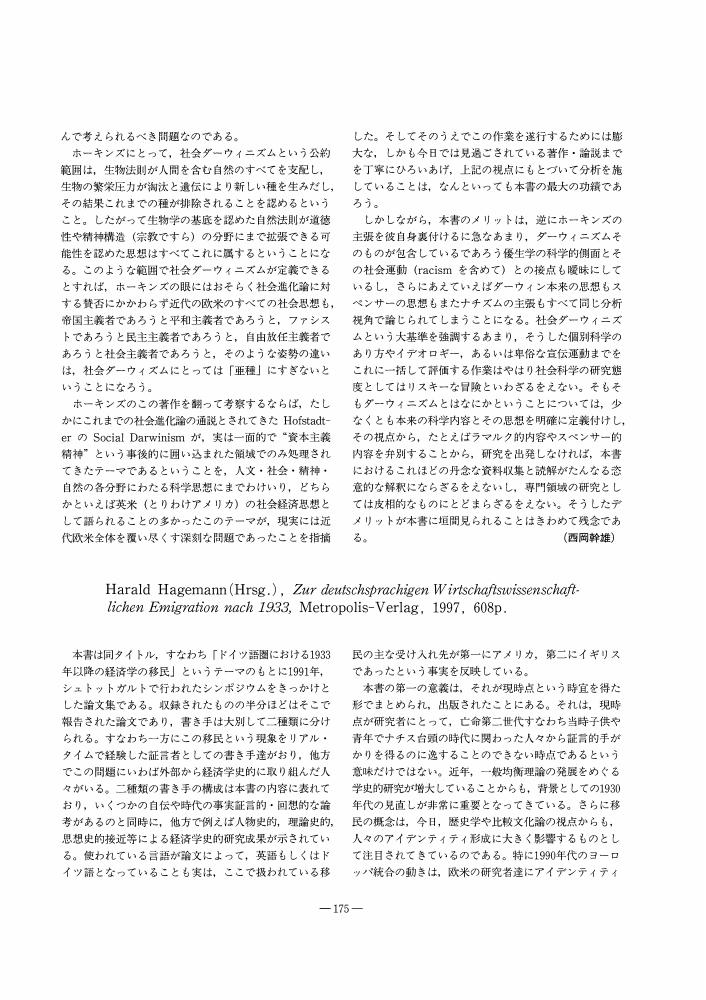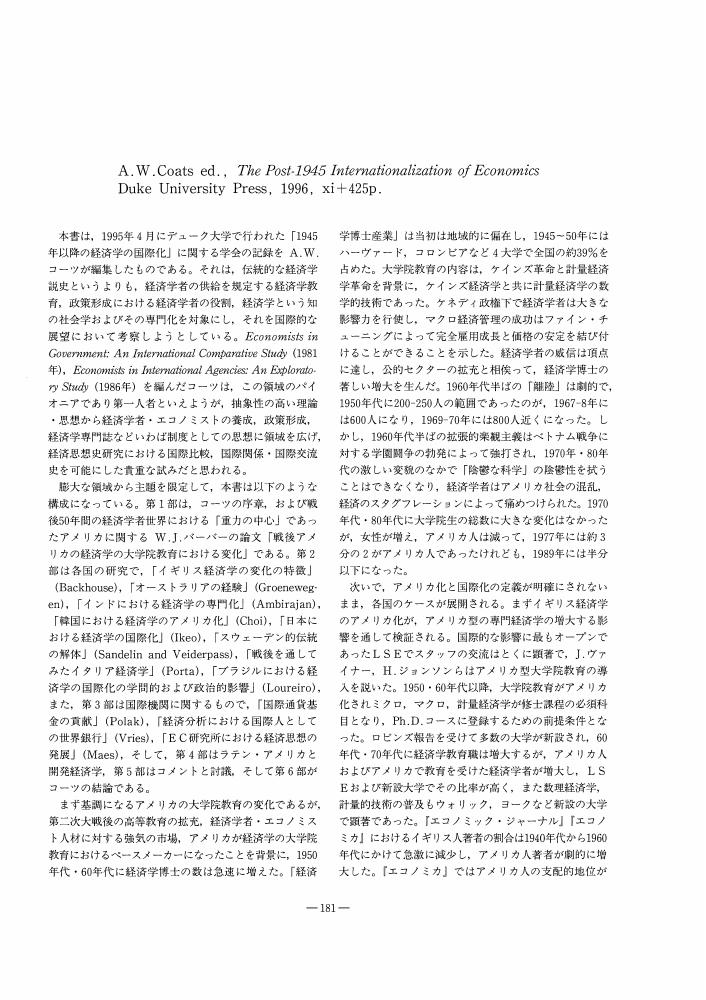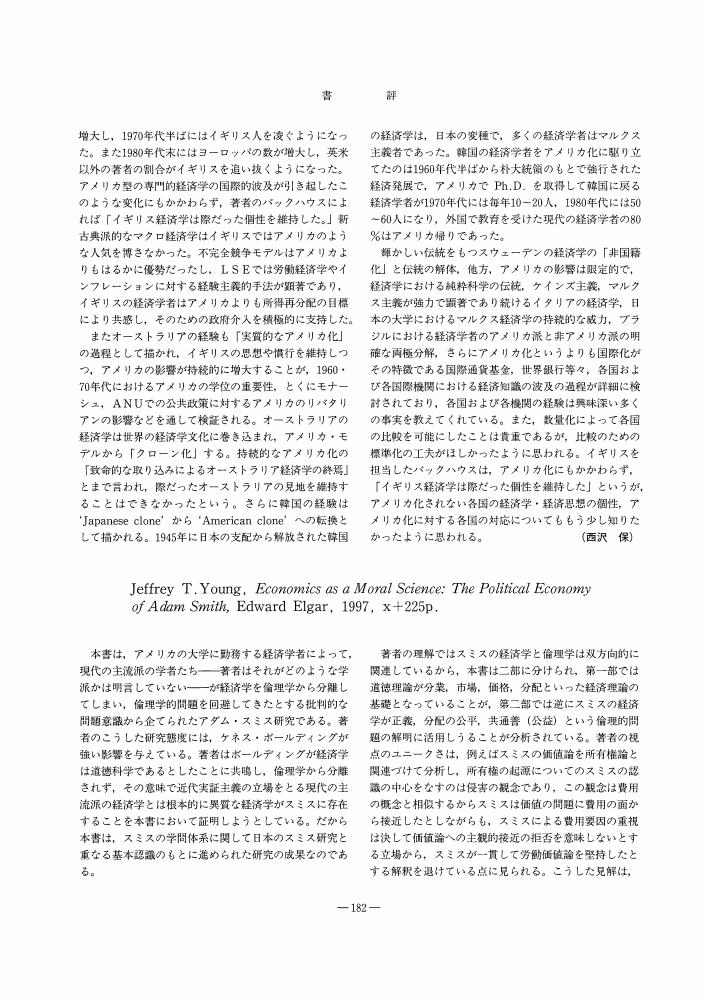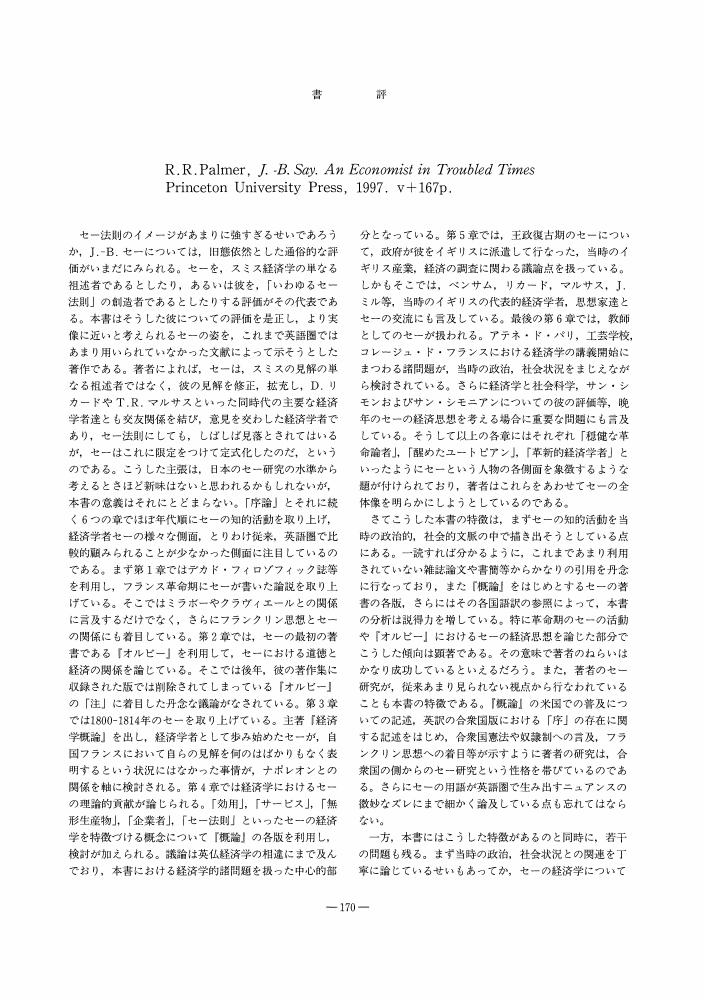1 0 0 0 OA ロバートソンとホートリーのマクロ的貨幣理論
- 著者
- 小原 英隆
- 出版者
- The Japanese Society for the History of Economic Thought
- 雑誌
- 経済学史学会年報 (ISSN:04534786)
- 巻号頁・発行日
- vol.37, no.37, pp.126-133, 1999 (Released:2010-08-05)
- 参考文献数
- 39
- 著者
- 田中 敏弘
- 出版者
- The Japanese Society for the History of Economic Thought
- 雑誌
- 経済学史学会年報 (ISSN:04534786)
- 巻号頁・発行日
- vol.37, no.37, pp.134-140, 1999 (Released:2010-08-05)
- 参考文献数
- 21
- 著者
- 渡会 勝義
- 出版者
- The Japanese Society for the History of Economic Thought
- 雑誌
- 経済学史学会年報 (ISSN:04534786)
- 巻号頁・発行日
- vol.36, no.36, pp.187-189, 1998 (Released:2010-08-05)
1 0 0 0 OA Roger E. Backhouse, Truth and Progress in Economic Knowledge Edward Elgar, 1997, xi+232p.
- 著者
- 深貝 保則
- 出版者
- The Japanese Society for the History of Economic Thought
- 雑誌
- 経済学史学会年報 (ISSN:04534786)
- 巻号頁・発行日
- vol.36, no.36, pp.189-191, 1998 (Released:2010-08-05)
- 著者
- 中久保 邦夫
- 出版者
- The Japanese Society for the History of Economic Thought
- 雑誌
- 経済学史学会年報 (ISSN:04534786)
- 巻号頁・発行日
- vol.36, no.36, pp.191-192, 1998 (Released:2010-08-05)
1 0 0 0 OA 18世紀の金融危機と金融思想
- 著者
- 奥田 聡
- 出版者
- The Japanese Society for the History of Economic Thought
- 雑誌
- 経済学史学会年報 (ISSN:04534786)
- 巻号頁・発行日
- vol.37, no.37, pp.1-13, 1999 (Released:2010-08-05)
- 参考文献数
- 39
Throughout the eighteenth century, as many economic historians have remarked, the financial markets in Northwestern Europe became integrated. Many studies have been conducted on the monetary theory and policy of that time. However, few studies have been done on monetary thought in this particular historical context. The purpose of this article is to present an alternative point of view from which to study the monetary thought of that age. First, based on recent studies, we surveyed the time period of financial crisis spanning from the Mississippi Bubble to the suspension of the Bank of England in order to ascertain the financial circumstances of that time. Second, we also surveyed studies on monetary thought of the contemporary theorists related to movement of capital and circulation of paper money. Finally, we reassert the importance of such a point of view in the historical context.
1 0 0 0 OA 現代の金融危機とマルクス信用論の射程
- 著者
- 川波 洋一
- 出版者
- The Japanese Society for the History of Economic Thought
- 雑誌
- 経済学史学会年報 (ISSN:04534786)
- 巻号頁・発行日
- vol.37, no.37, pp.14-27, 1999 (Released:2010-08-05)
The theoretically effective range of K. Marx's credit theory is examined in this paper by comparing periodic financial crises in the 19th century to contemporary financial crisis. In his analysis of the 19th century financial crises, Marx not only criticized the existing monetary theory but assimilated its effectiveness, interpreting the financial crisis as a contradiction between the real economy and the monetary economy.The 20th century exhibits several new aspects of financial crisis such as the expansion and implosion of the stock market during the 1920s and the 1930s, frequent occurrences of financial crisis in the post-war U. S. economy, and the international financial crisis during the 1990s. The new aspects of the contemporary financial system, such as the development of securities market, adoption of a managed currency system, etc., emphasize the requirement for a new theory of financial crisis.However, given that Marx's credit theory, which declared the internal relationship between accumulation of real capital and the movement of financial transactions, is an effective base for analysis, this paper concludes that the contemporary financial crisis is within the range of effectiveness of Marx's credit theory.
1 0 0 0 OA D. リカードウ『公債制度論』の論理構造
- 著者
- 益永 淳
- 出版者
- The Japanese Society for the History of Economic Thought
- 雑誌
- 経済学史学会年報 (ISSN:04534786)
- 巻号頁・発行日
- vol.37, no.37, pp.44-56, 1999 (Released:2010-08-05)
- 参考文献数
- 20
In this paper, I will consider the significance of the ‘equivalence theorem’ of Ricardo. The theorem was explained most clearly in his Funding System (1820), in which it plays an important role.The ‘equivalence theorem’ appears as a theoretical foundation, and highlights Ricardo's conclusions about the funding system and the sinking fund. Demonstrating in advance that the theorem is correct in theory, Ricardo proceeded to emphasize that it is inaccurate in practical application. According to Ricardo, the causes of this inaccuracy were the ‘fiscal illusion’ of the people and the political corruption, which contributed to the diversion of the sinking fund to other purposes rather than toward redeeming public debt.In my view, the latter cause is of note, particularly in light of the fact that Ricardo was an ardent supporter of parliamentary reform. If we take this ardor into account, it becomes clear that the ‘equivalence theorem’ is the theoretical basis from which to emphasize a defect in the British constitution and to imply the necessity of its reform. Therefore, the significance of the ‘equivalence theorem’ should be understood not only in a theoretical context but from a political point of view.
- 著者
- 塘 茂樹
- 出版者
- The Japanese Society for the History of Economic Thought
- 雑誌
- 経済学史学会年報 (ISSN:04534786)
- 巻号頁・発行日
- vol.36, no.36, pp.172-173, 1998 (Released:2010-08-05)
- 著者
- 西岡 幹雄
- 出版者
- The Japanese Society for the History of Economic Thought
- 雑誌
- 経済学史学会年報 (ISSN:04534786)
- 巻号頁・発行日
- vol.36, no.36, pp.174-175, 1998 (Released:2010-08-05)
- 著者
- 中山 智香子
- 出版者
- The Japanese Society for the History of Economic Thought
- 雑誌
- 経済学史学会年報 (ISSN:04534786)
- 巻号頁・発行日
- vol.36, no.36, pp.175-176, 1998 (Released:2010-08-05)
- 著者
- 山崎 好裕
- 出版者
- The Japanese Society for the History of Economic Thought
- 雑誌
- 経済学史学会年報 (ISSN:04534786)
- 巻号頁・発行日
- vol.36, no.36, pp.177-178, 1998 (Released:2010-08-05)
- 著者
- 中村 秀一
- 出版者
- The Japanese Society for the History of Economic Thought
- 雑誌
- 経済学史学会年報 (ISSN:04534786)
- 巻号頁・発行日
- vol.36, no.36, pp.178-180, 1998 (Released:2010-08-05)
- 著者
- 西沢 保
- 出版者
- The Japanese Society for the History of Economic Thought
- 雑誌
- 経済学史学会年報 (ISSN:04534786)
- 巻号頁・発行日
- vol.36, no.36, pp.181-182, 1998 (Released:2010-08-05)
- 著者
- 八幡 清文
- 出版者
- The Japanese Society for the History of Economic Thought
- 雑誌
- 経済学史学会年報 (ISSN:04534786)
- 巻号頁・発行日
- vol.36, no.36, pp.182-183, 1998 (Released:2010-08-05)
- 著者
- 有江 大介
- 出版者
- The Japanese Society for the History of Economic Thought
- 雑誌
- 経済学史学会年報 (ISSN:04534786)
- 巻号頁・発行日
- vol.36, no.36, pp.183-185, 1998 (Released:2010-08-05)
- 著者
- 松浦 保
- 出版者
- The Japanese Society for the History of Economic Thought
- 雑誌
- 経済学史学会年報 (ISSN:04534786)
- 巻号頁・発行日
- vol.36, no.36, pp.185-187, 1998 (Released:2010-08-05)
- 著者
- 田中 秀夫
- 出版者
- The Japanese Society for the History of Economic Thought
- 雑誌
- 経済学史学会年報 (ISSN:04534786)
- 巻号頁・発行日
- vol.36, no.36, pp.168-169, 1998 (Released:2010-08-05)
1 0 0 0 OA R. R. Palmer, J. -B. Say. An Economist in Troubled Times Princeton University Press, 1997. v+167p.
- 著者
- 喜多見 洋
- 出版者
- The Japanese Society for the History of Economic Thought
- 雑誌
- 経済学史学会年報 (ISSN:04534786)
- 巻号頁・発行日
- vol.36, no.36, pp.170-171, 1998 (Released:2010-08-05)
- 著者
- 原田 哲史
- 出版者
- The Japanese Society for the History of Economic Thought
- 雑誌
- 経済学史学会年報 (ISSN:04534786)
- 巻号頁・発行日
- vol.36, no.36, pp.171-172, 1998 (Released:2010-08-05)
















